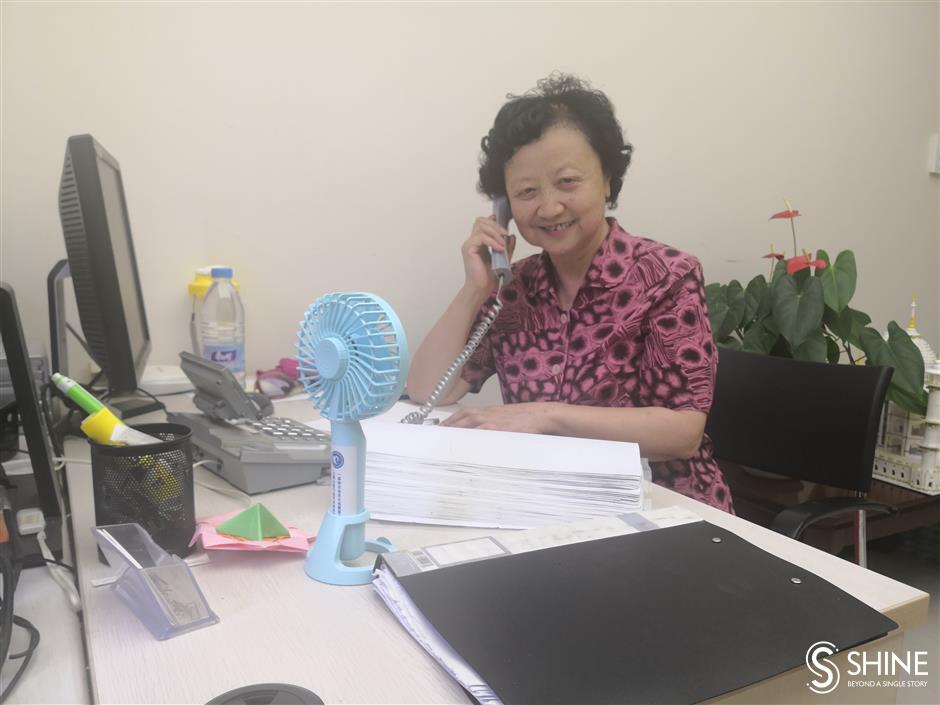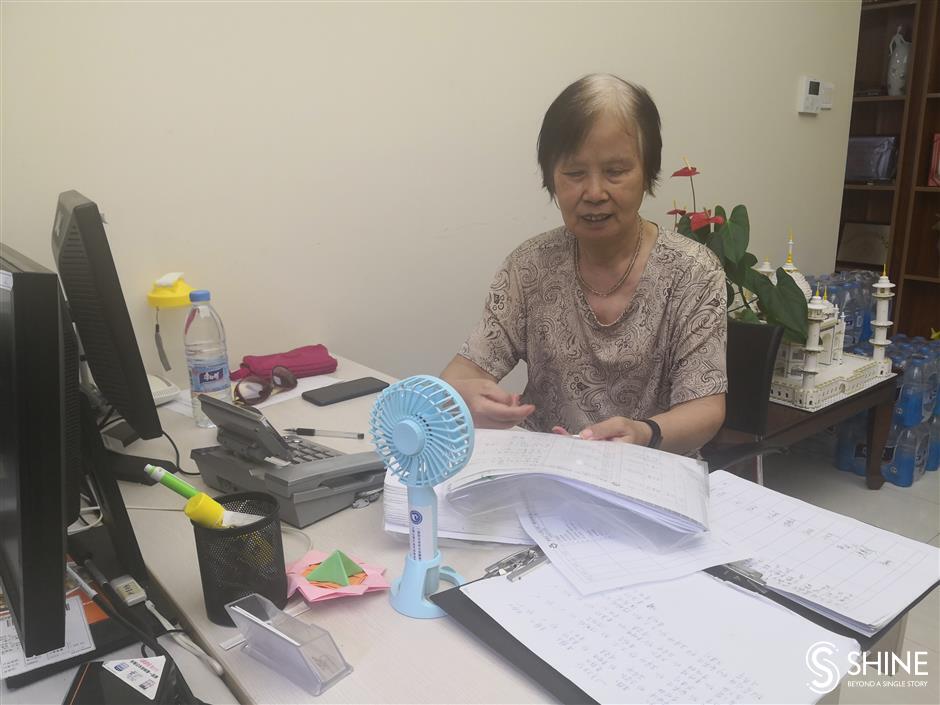
Volunteer Guan Peimei, 72, calls seniors.
It was a cold winter’s day when Lao Shen (Old Shen), 74, who lives alone in Huangpu District, collapsed at home.
He managed to find the strength to make one phone call. It was to the Xinyue Xiyang psychosocial hotline center on Nanchang Road.
When later asked why he called the hotline instead of the usual emergency number at a life-and-death moment, he said, “because I often receive phone calls from them and feel cared for.”
Xinyue Xiyang opened its first hotline in 2008 in Huangpu District and has since expanded to 10 subdistricts.
More than 370,000 seniors have received psychosocial services, including about 2,000 serious cases.
The psychosocial approach looks at the psychological factors and social environment that influence an individual’s physical and mental health.
The hotline acts as a bridge between some 1,000 volunteers, also seniors, and lonely elderly people in the district.
The hotline staff don’t sit around waiting for phone calls. They proactively phone seniors on a regular basis to see how they are doing, said Pu Jun, director of the counseling station.
The Ruijin No. 2 Road Subdistrict was the first in Huangpu to trial the service. It has a thick book containing contact information of 1,080 seniors living alone in 16 neighborhoods. The book is worn from constant use.
Every working day, volunteers make 50 calls, with each senior receiving at least one a month. The book logs details such as hearing problems and language difficulties.
Names crossed out indicate people who have died.
Huangpu is one of Shanghai’s most aging districts. At the end of last year, it had 326,100 people 60 years or older, accounting for near two-fifths of the population. Of that number, 6.5 percent were aged 80 years or older.
Zhu Meiling, 72, is among the center’s first volunteers. She was once a factory worker and wasn’t content to do nothing in retirement.
"Instead of dancing or playing mahjong, I wanted to do something meaningful," she explained.
When on duty, she sits in front of a phone in the center and starts making calls.
"Hello! This is the counseling office. How have you been lately?” she asks in Shanghai dialect. "Oh, it’s nothing important. I just want you to take good care of yourself on these hot days. Keep in a good mood and have a nice day. Bye!”
The call is noted in the book, with any pertinent details added. If a senior doesn’t pick up the phone or some time, a volunteer goes to the home.
 Hu Min / SHINE
Hu Min / SHINEVolunteer Zhu Meimei, 79, checks a contact book containing contact information of 1,080 seniors.
In 2007, several seniors in Huangpu District committed suicide because of serious depression. That was the impetus in the formation of the hotline.
"They had good financial situations and lived in the most downtown area of Shanghai," director Pu said of the deaths. "Many people could not understand why they committed suicide."
Desperate loneliness.
"Seniors in both urban and rural areas face the problem of loneliness, but they are different," he said. "In Shanghai's countryside, seniors have people nearby to chat with, while in urban areas, the elderly often keep themselves to themselves and are locked in their own lonely worlds.”
There is the case of a retired woman who wanted to commit suicide because of family difficulties. Her husband died and her daughters treated her with indifference.
It was volunteer Guan Peimei, 72, who helped the women back from the abyss.
"I listened to what she had to say, comforted her and offered some advice," said Guan.
"I kept in contact with her. I tell seniors to call the hotline whenever they feel the need. The hotline is always open, ready to give them a sense of caring, security and warmth.”
Volunteer Zhu Meimei, 79, the oldest of the volunteer team, said seniors and volunteers become friends, even family.
"I open my heart to them and they open their hearts to me,” she said.
Volunteer Tan Manlian, 76, told the story of retired psychology teacher whose husband and daughter died. She suffered from serious diabetes and felt her world was falling apart.
“In such a situation, it’s hard to lift yourself up," the woman told Tan.
Volunteer Zhu Meiling said it’s important to build trust with clients.
"More importantly, you must respect them and thus create a long-term relationship,” she said.
In 2012, a "senior friend peer program" was launched in the community, with each volunteer paired with five seniors 80 years or older.
Granny Kong, 88, who was paired with Zhu Meiling, said she didn’t think she needed any psychosocial comfort at first. Her husband and son died, and her daughter lives overseas.
"I don't like volunteers, and I refuse their help if they behave like they are giving me charity," said Kong.
Zhu was patient and eventually won Kong’s trust. Now she even has a spare key to her home.
"Zhu is like my only family member," Kong said.
Zhu recalled the time when a 95-year-old woman she was paired with wanted to buy a necklace. Zhu took her to a nearby shopping mall, but in the end, no purchase resulted because prices were so high. Still, the woman was grateful for the outing.
"Though volunteers can't achieve all their dreams, we can accompany them in search of them," she said.
Another client is an eccentric old man who never married. He has no financial problems but because of his personality, neighbors avoid him.
A psychosocial volunteer comes to talk to him periodically to try to ease him out of his isolation.
"Our counseling service aims to help these elderly people find the ability to shake off blue moods and let them know there is a place to turn to for help,” Pu explained.
Chen Honglin, an associate professor of the department of sociology at Fudan University, is a member of this counseling service program. She trains volunteers in how to communicate with the elderly.
"Compared with professional psychologists, these volunteers have the advantage of the common touch because they are neighbors and have similar life experiences and values,” Chen said. “That makes it easier to break the ice and build a stable relationship."
The downside for volunteers is coping with the deaths of seniors they have befriended.
In April, Zhu Meiling bid farewell to 89-year Granny Huang, who died of cancer and always refused to go to hospital. Her two daughters were overseas, so Zhu finally prevailed and took her in a wheelchair to Ruijin Hospital.
"She said she was grateful and happy to hear my voice," Zhu recalled in tears. "She said she was not alone with me as a friend and asked whether I would be her volunteer in the next life."
